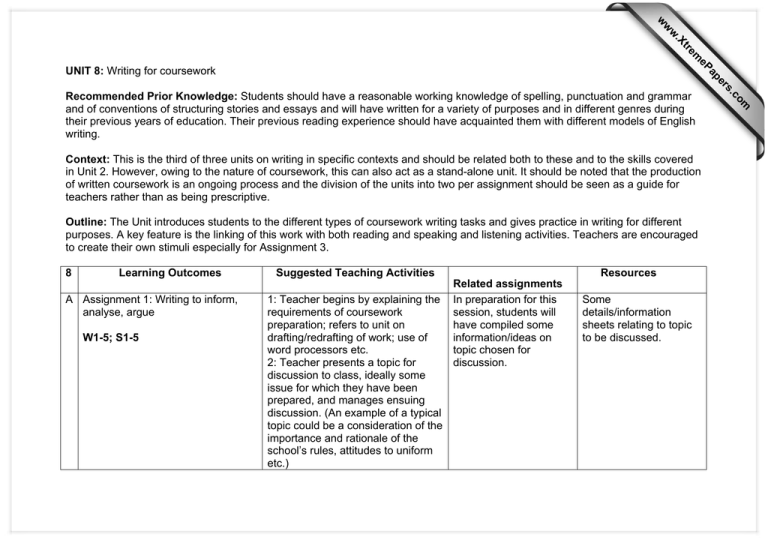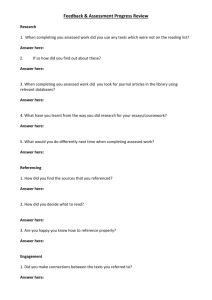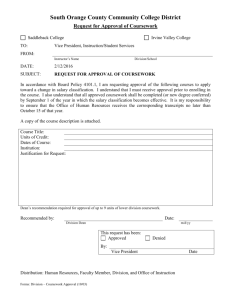UNIT 8: Recommended Prior Knowledge:
advertisement

Context: This is the third of three units on writing in specific contexts and should be related both to these and to the skills covered in Unit 2. However, owing to the nature of coursework, this can also act as a stand-alone unit. It should be noted that the production of written coursework is an ongoing process and the division of the units into two per assignment should be seen as a guide for teachers rather than as being prescriptive. Outline: The Unit introduces students to the different types of coursework writing tasks and gives practice in writing for different purposes. A key feature is the linking of this work with both reading and speaking and listening activities. Teachers are encouraged to create their own stimuli especially for Assignment 3. 8 Learning Outcomes A Assignment 1: Writing to inform, analyse, argue W1-5; S1-5 Suggested Teaching Activities 1: Teacher begins by explaining the requirements of coursework preparation; refers to unit on drafting/redrafting of work; use of word processors etc. 2: Teacher presents a topic for discussion to class, ideally some issue for which they have been prepared, and manages ensuing discussion. (An example of a typical topic could be a consideration of the importance and rationale of the school’s rules, attitudes to uniform etc.) Resources Related assignments In preparation for this session, students will have compiled some information/ideas on topic chosen for discussion. Some details/information sheets relating to topic to be discussed. om .c Recommended Prior Knowledge: Students should have a reasonable working knowledge of spelling, punctuation and grammar and of conventions of structuring stories and essays and will have written for a variety of purposes and in different genres during their previous years of education. Their previous reading experience should have acquainted them with different models of English writing. s er ap eP m e tr .X w w w UNIT 8: Writing for coursework 8 Learning Outcomes B Assignment 1: Writing to inform, analyse, argue W1-5; S1-5 Suggested Teaching Activities 1: Teacher recaps on main points of previous discussion and introduces writing task. (In the example given, the students could be asked to jot down their memories of their first week at the school as a preliminary task to writing a guide for new students.) 2: Teacher acts as mentor and guide to students individually as they work through first and final drafts of their assignment. Related assignments (The time allowed for production of coursework assignments must be dependent on the situation of individual schools, but, in general, two weeks of lesson and homework time should be sufficient to produce a first and final draft.) Students work at producing first draft and final draft of their assignment. For the exemplar task, they should aim to provide an insider’s view of the school and its procedures, which allow them to be both informative and analytical. The need to focus on a specific audience and write in an appropriate register is particularly important. Resources Students to research their own material for relevant information; teacher to provide copies of published material as appropriate. 8 Learning Outcomes C Assignment 2: Writing to imagine, describe, narrate W1-5 D Assignment 2: Writing to imagine, describe, narrate W1-W5 Suggested Teaching Activities Teacher introduces assignment and explains possibilities to class. Although it is possible to allow confident writers the opportunity to have a free choice of topic, it is also helpful for the teacher to provide suggested topics and exemplars for those less confident. (For example, this task could be linked in some way to Assignment 1; the example given above could be followed by a narrative title Breaking the Rules.) The teacher should offer the class a range of topics covering all three areas. Teacher to act as mentor to individual students as and when they present first draft coursework. As a general practice, the teacher’s marking should alert students to the presence of error but teachers must not correct individual mistakes. Emphasis should be given to improving the quality of expression, choice of vocabulary etc when advising on the final draft, with close reference being made to the coursework band descriptors in the IGCSE Syllabus. Related assignments Students to plan and work on first draft of their chosen subject, aiming to produce a piece of writing (or collection of pieces) of full, but not excessive, length. At this stage, emphasis should be on structuring and planning the work as a whole and very much as a first draft. Resources Suitable range of topics perhaps taken or based on previous IGCSE papers. A selection of exemplars to stimulate the imagination. Students work in collaboration with their teacher, at producing final draft of their assignment, concentrating especially on precision of vocabulary and on adding convincing circumstantial details to supplement their basic narrative. Suitable selection of exemplar material. The teacher! 8 Learning Outcomes E Assignment 3: Critical response to texts W115; R1-4 F Assignment 3: Critical response to texts W1-5; R1-4 Suggested Teaching Activities Teacher to present class with a range of stimulus material (information texts, reviews, advertisements etc) and initiate a consideration of the differences between fact and opinion, followed up by a detailed consideration of the ways writers use language and image to influence their readers’ responses. Related assignments 1: Students to read a range of passages in order to identify facts and opinions and to be prepared to justify their views. 2: Students to read and analyse different texts, considering, in particular, the writers’ use of (emotive) language and the ways in which they have tailored their arguments to produce a particular response. Teacher introduces coursework 1: Students, working in assignment and explains the criteria small groups (3 or 4) involved in the analysis. Teacher discuss the features of either presents class with a suitable the chosen texts with passage or passages for analysis or each other, sharing students use material which they ideas and making notes. have researched and found for 2: Students produce first themselves (with teacher’s and final draft after approval). A comparison of the discussion with teacher; methods used in two contrasting concentration on texts (for example, non-fiction and explaining and justifying media) on a similar topic would their comments is provide a good starting point. important. Resources Suitable range of stimulus material taken either from appropriate text books or centreproduced resource sheets. Suitable range of material to allow the detailed analysis required.


